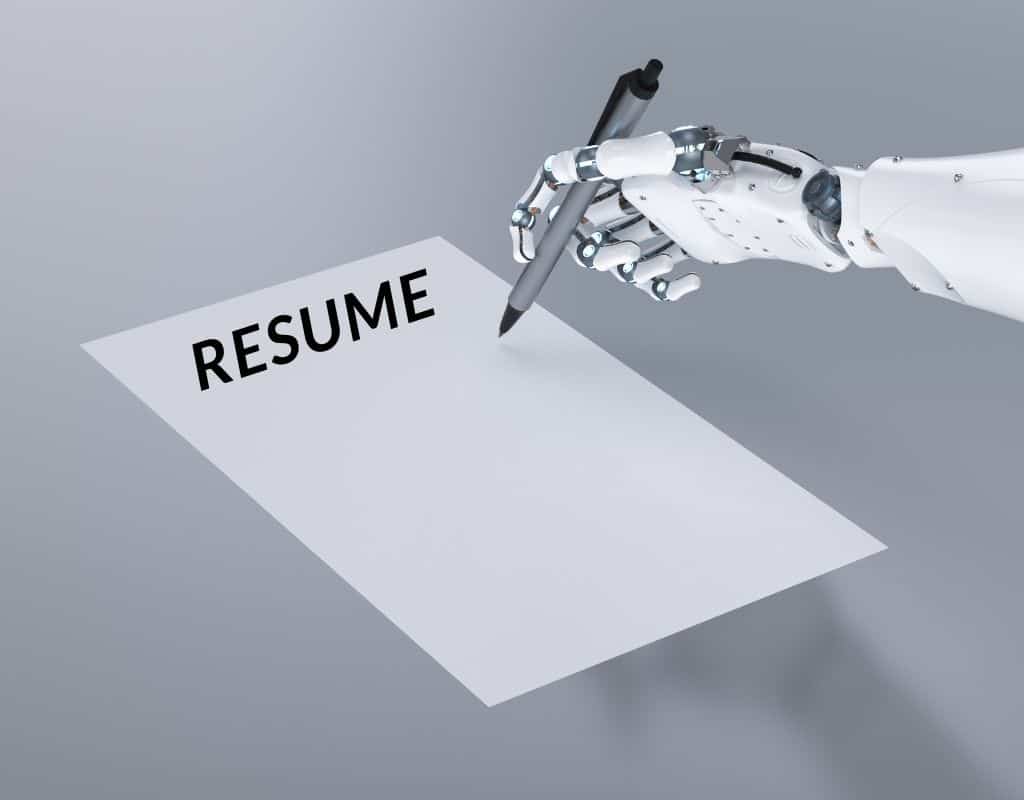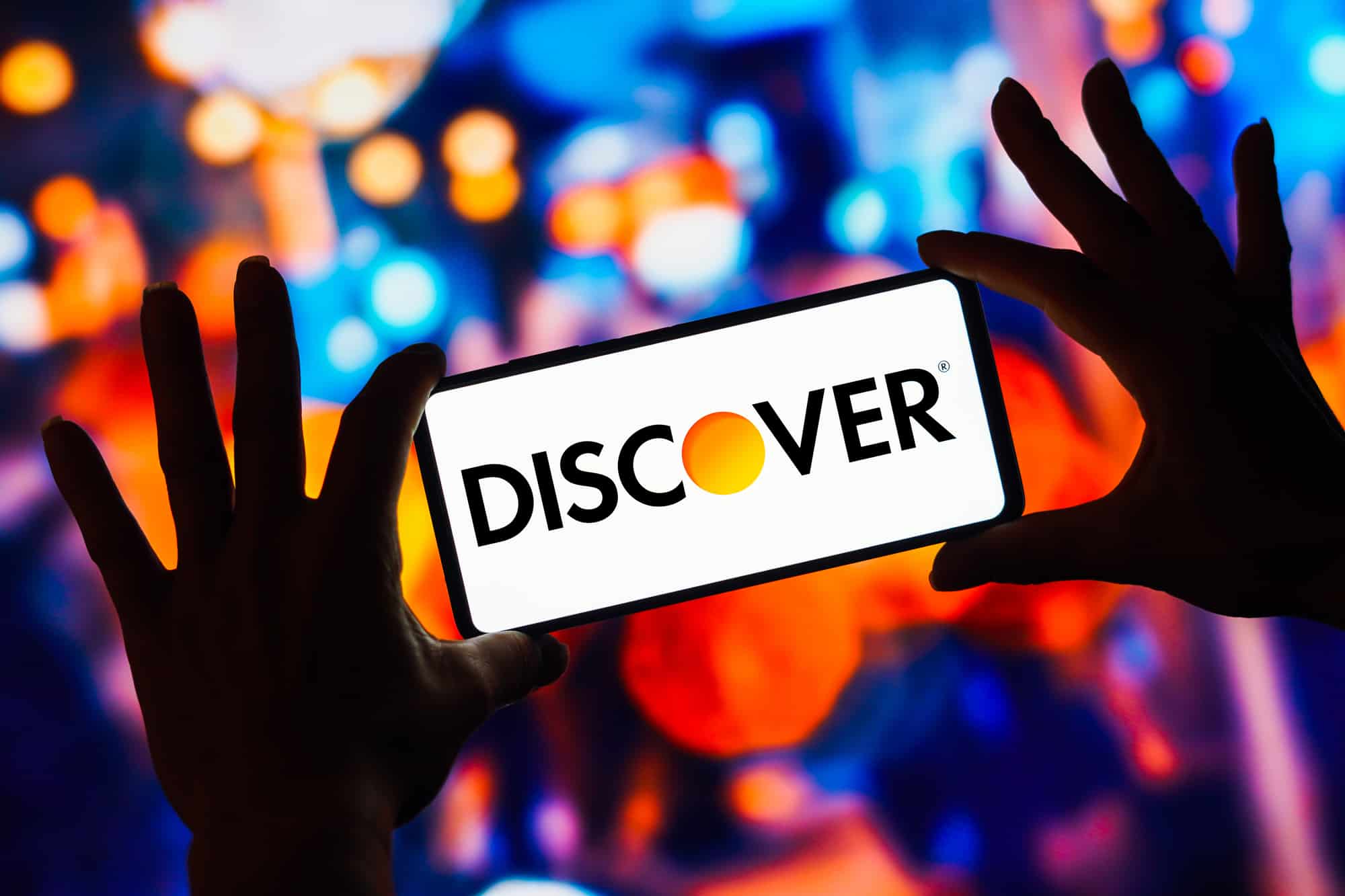Whether you think artificial intelligence (AI) is coming for your job or not, it’s here to stay. And the buzziest of all AI is ChatGPT. Though it’s capable of many things, should ChatGPT write your resume?
Consider ChatGPT’s compelling results. A recruiter put ChatGPT-generated documents to the test and found that they landed interviews. And one survey found that out of 1,000 job seekers, 46% were using ChatGPT to help with resume writing and cover letter creation. Of those, 78% say they got an interview and 59% claim they were hired. In addition, nearly 70% of job seekers report a higher response rate from companies when they use a ChatGPT resume or cover letter to help them apply.
But does that mean using ChatGPT to write your resume is the right choice? Maybe. I ran a number of experiments and put ChatGPT to the test writing and rewriting resumes — including mine.
What Is ChatGPT and What Does It Do?
ChatGPT is built on natural language processing (NLP). In short, the bot is trained to understand text the way humans do. It “learns” through the use of data sets, or large amounts of information that “teach” the AI how to recognize patterns. From that training, the AI learns how to craft a response that seems relatively life-like and, in most cases, reasonable.
>>MORE: What Is Machine Learning?
Using ChatGPT to Write a Resume
Using ChatGPT consists of two parts: the prompt and the output. The prompt is your instructions to ChatGPT and the output is the bot’s response. For my first round of testing, I gave ChatGPT some basic prompts: Write a resume for X. Here’s what I got.
>>RELATED: What Jobs Will AI Replace and What Can You Do About It?
An entry-level software programmer:
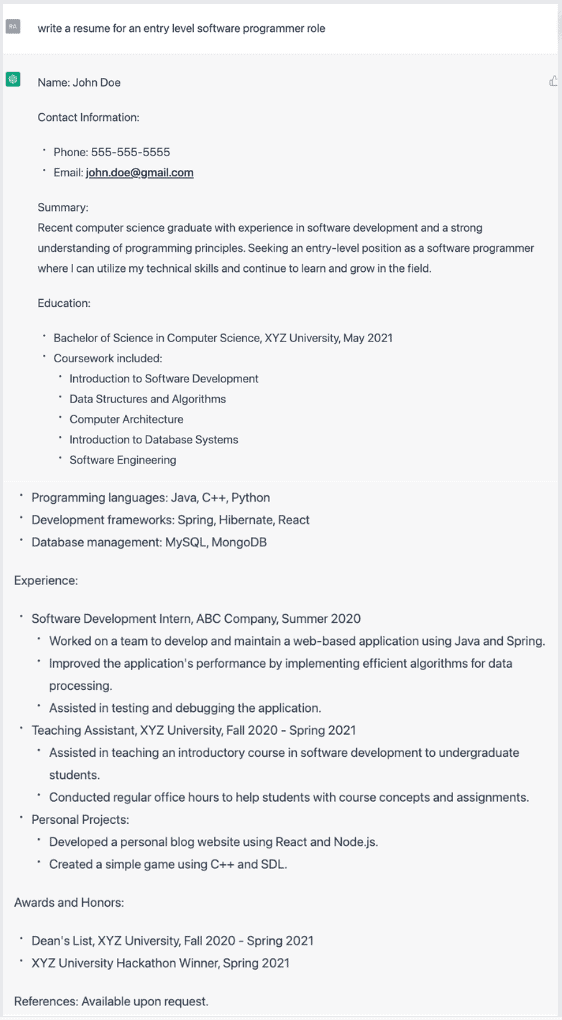
Entry-level financial analyst:
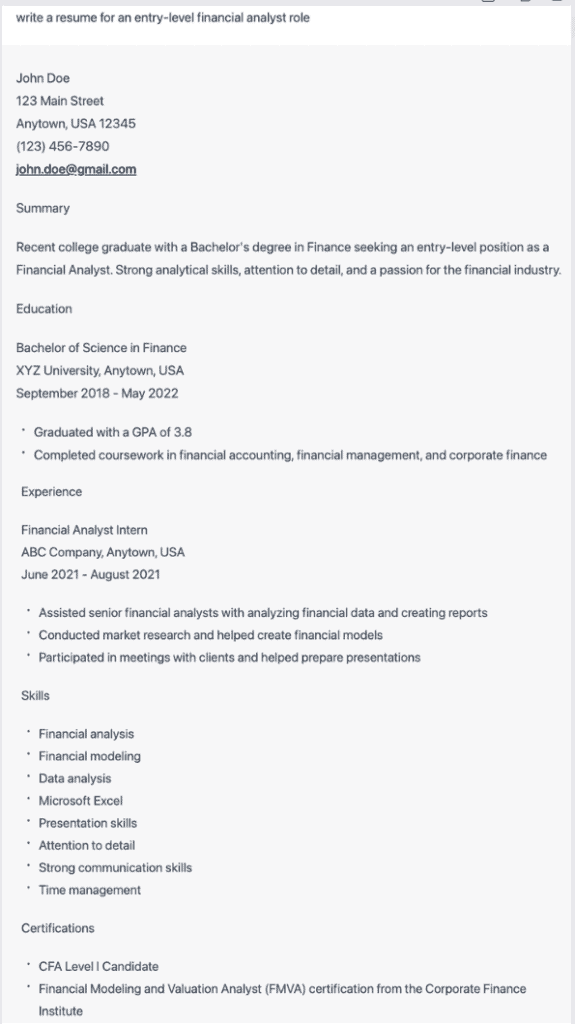
The deckhand on a pirate ship:
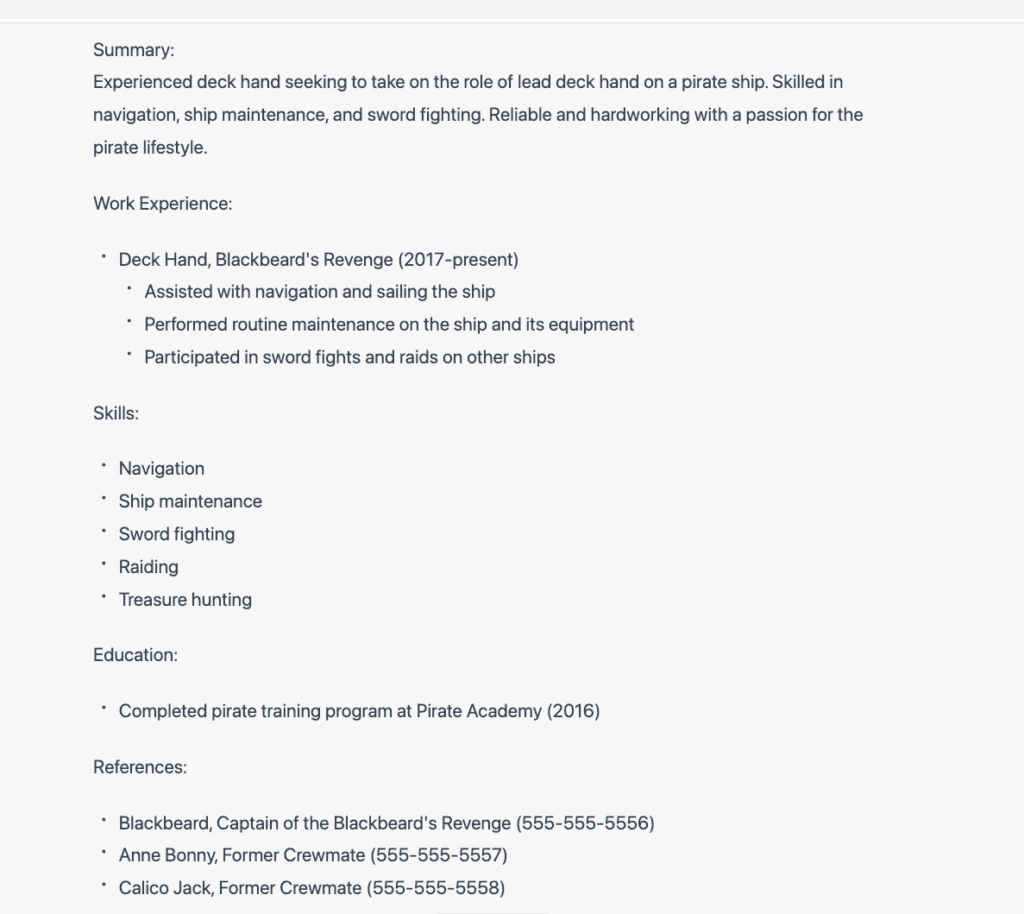
Overall, these resumes are just OK. The main problem is that they’re generally nothing more than a summary of the job seeker’s duties. None of these resumes describe how the candidate used their skills and abilities or what the positive result was.
>>MORE: Discover more ways to use ChatGPT to write your software engineer resume or financial analyst resume.
For example, the software programmer’s resume says, “Improved the application’s performance by implementing efficient algorithms for data processing.” That’s an excellent thing to point out to a potential employer but it doesn’t explain how much the performance improved.
It’s the same on the pirate deckhand’s resume. It lists specific skills, like sword fighting, raiding, and treasure hunting, but nowhere does it say how the deckhand used those skills or why it matters to the captain or the rest of the crew.
>>Find out why you need to talk about results in your resume. Read more about the STAR method and how it can help you throughout your job search.
These resumes also include things that are no longer necessary. The software resume includes the phrase “references available upon request,” the financial analyst resume includes a street address, and the deckhand resume is all in on the references, with names and phone numbers.
But the biggest problem with these resumes is that they are entirely made-up, or hallucinations. The ChatGPT resume includes fictitious work histories, job duties, degrees, certifications, and references!
The Problem With Prompts
All of these resumes fall short, but I’m willing to take the blame for that. I gave ChatGPT very broad prompts, which is likely what led to the hallucinations. Chat GPT was forced to fill in the gaps and predict what a resume for a financial analyst or deckhand would look like. And because ChatGPT had to make broad guesses, it couldn’t get any more specific than “improved performance.”
>>Learn how to write a resume without AI. Enroll in Forage’s Resume Writing Masterclass.
This is a common experience. Bonnie Dilber, recruiting manager at Zapier says, “When I initially asked ChatGPT to write resume bullet points, it did not include any metrics.”
How to Use ChatGPT to Write Your Resume
When ChatGPT-4 came out, I wondered how much the bot had improved. Would it produce better resumes that are worth the $20 a month investment?
GPT-4 Resume Writing Experiment #1
My first ask was for a resume for an entry-level financial analyst. Here’s what GPT-4 produced:
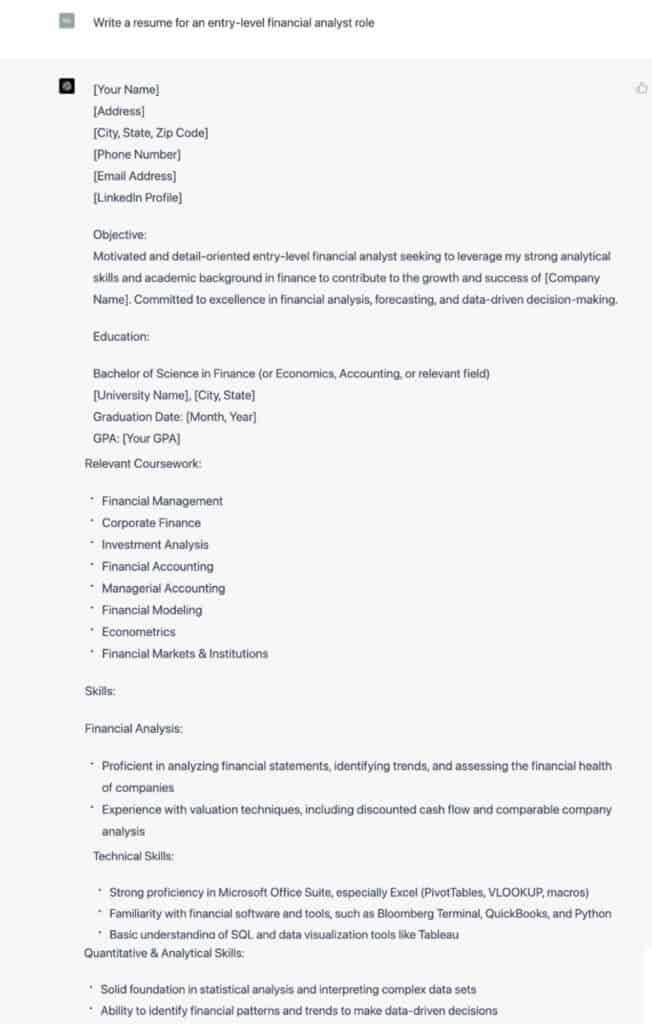
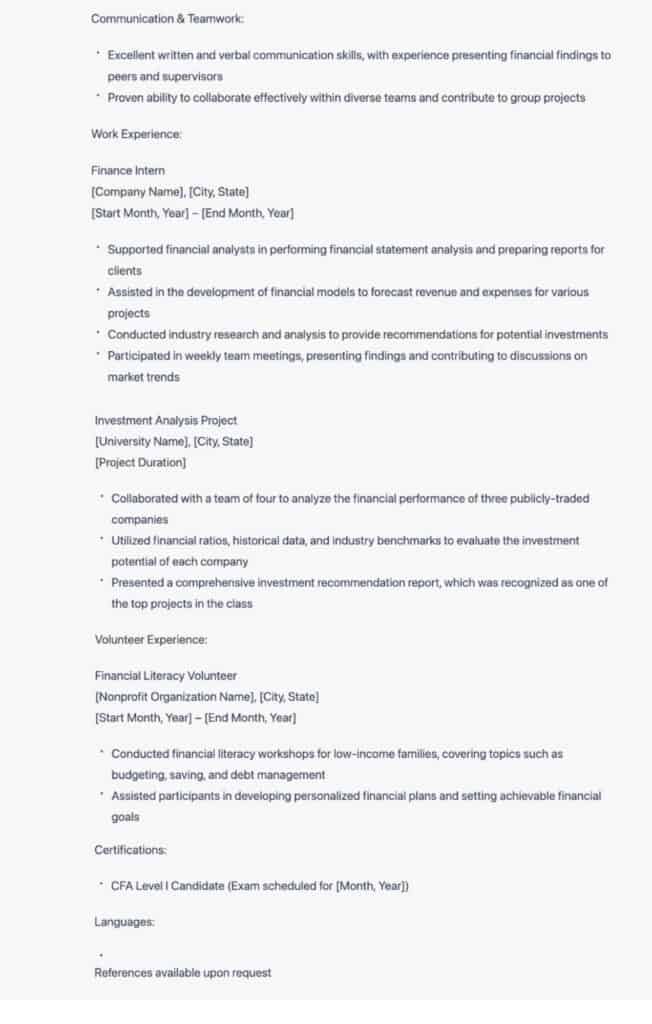
This is a very long ChatGPT resume full of hallucinations. It took approximately five screenshots to capture everything, compared to two screenshots from the earlier version. When I pasted the output in a Google doc and formatted it (Arial font, size 11), it was just over three pages long. And it still includes things like a full address, “references available upon request,” and an objective.
>>MORE: How Long Should a Resume Be in 2022?
The skills section on this resume is broken into two categories, like what you might do on a functional resume. However, it takes up a lot of space. The section is “Skills,” and that’s subdivided into “Technical,” “Quantitative and Analytical Skills,” and “Communication and Teamwork.” While separating your hard and soft skills might be helpful to the reader, you’re probably better off condensing this section into something smaller or including it as part of the professional summary.
>>MORE: The 20 best skills to include on your resume
The skills section also doesn’t include quantifiable results. Mentioning strong Microsoft Excel skills (like PivotTables) is a smart idea. But you need to explain how you use your Excel skills at work or in school.
>>MORE: Learn Microsoft Excel skills. Enroll in Goldman Sachs’ Excel Skills for Business Virtual Job Simulation.
GPT-4 Resume Writing Experiment #2
Of course, we couldn’t conduct our experiment without asking for a pirate deckhand resume:
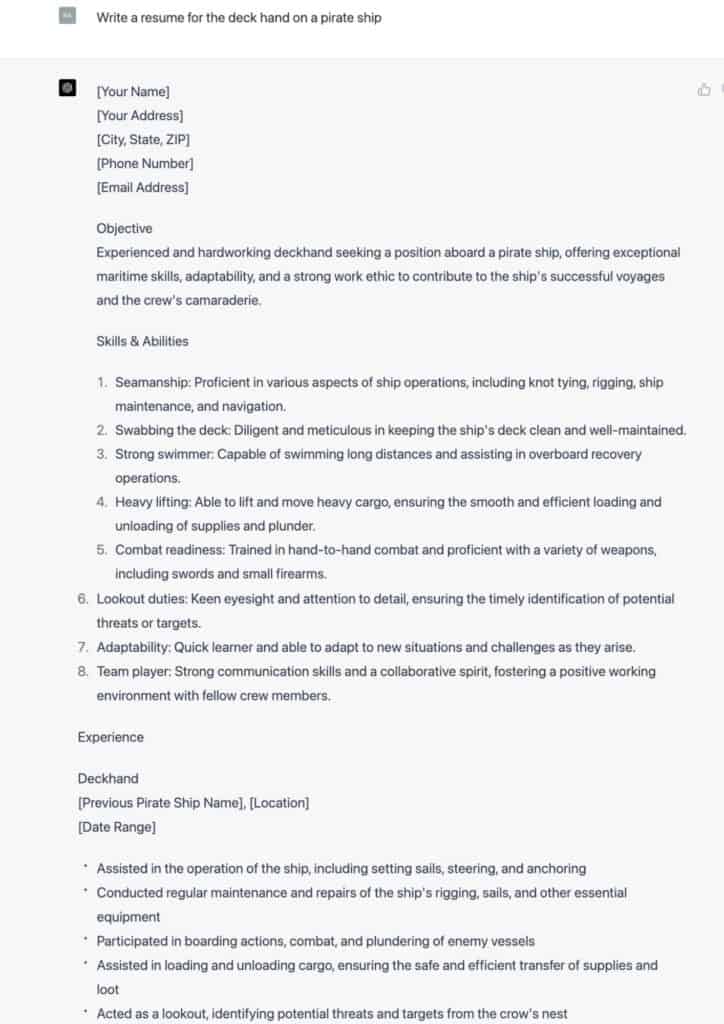
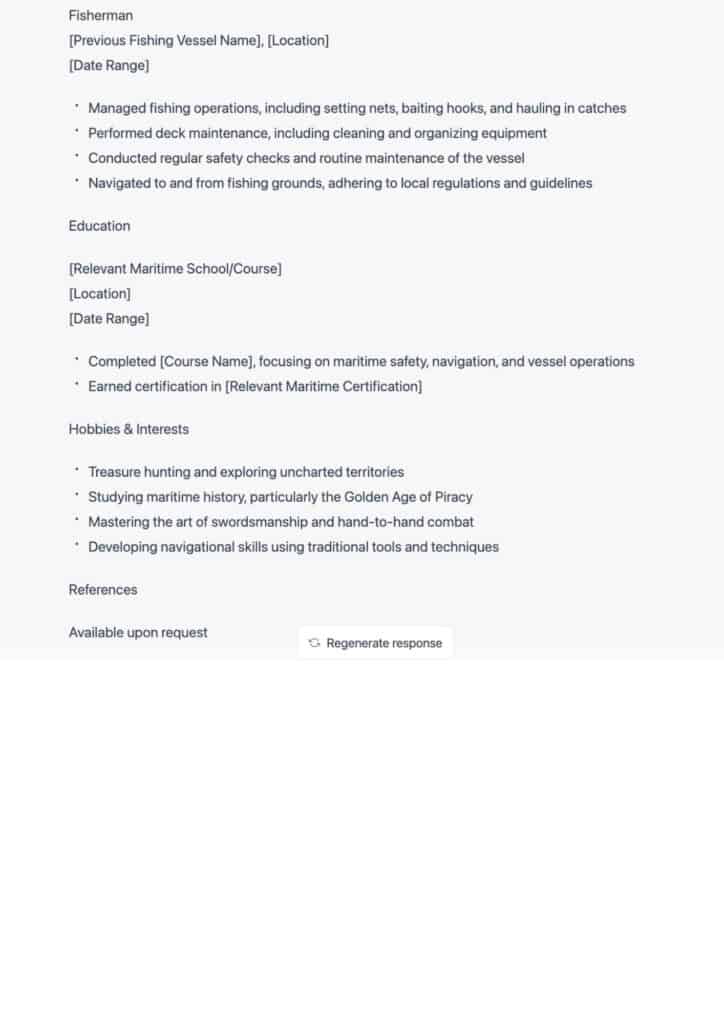
While this resume is shorter, it contains many of the above concerns. However, this Chat-GPT resume does a better job explaining how the deckhand uses their skills for the good of the entire crew compared to the earlier version.
Take a look at the “Skills and Abilities” section. Though the section is numbered, which you wouldn’t normally do on a resume, check out number six: Lookout duties. This is neither a skill nor an ability. It’s a job duty and in the wrong section (or the section is mislabeled) but the resume explains how the deckhand uses their skills and abilities to help the team:
Lookout duties: Keen eyesight and attention to detail, ensuring the timely identification of potential threats or targets.
While a bit clunky, this isn’t bad. It’s a decent example of quantifying your abilities into measurable results. A better version might be:
Keen eyesight and attention to detail: Ensure timely identification of potential threats or targets while on lookout duty.
The rewrite emphasizes your skills first, how you used your skills to help the team, and then mentions the duties of the role.

Artificial Intelligence
See what it's like to work behind the scenes in AI in this free course from Cognizant. Learn how to frame a problem statement, build a predictive model, interpret results, and more.
Avg. Time: 3-4 hours
Skills you’ll build: Data analysis, Python, data visualization, machine learning, model interpretation
Using ChatGPT to Write a Real Resume
Asking Chat-GPT to whip up a resume is fun. But none of our experiments are for real people, which explains the hallucinations.
So, what happens when your input consists of real information for a real person?
How ChatGPT Rewrote My Resume
I input parts of my resume to ChatGPT and asked for improvements.
The first thing I noticed is that the ChatGPT resume is in the past tense. That’s fine for my previous positions but not my current one. I’m doing all those things right now!
Outside of that grammatical error, though, the rewrites were just OK.
For example, I have, “Produce content according to calendar due dates.” That’s not fantastic (and I could do better), but it’s accurate. ChatGPT changed it to “Managed content production calendar.” There’s no denying that’s an improvement, which is exactly what I asked for. But it’s not true, not even a little. In that role, I never managed the content calendar.
Improving ChatGPT’s Improvements
But, once again, the fault lies with me. I gave ChatGPT a very general prompt. So, I tried drilling down my inputs to see if I could improve ChatGPT’s improvements.
I asked ChatGPT to rewrite this bullet point. I picked it because it’s short and doesn’t include any metrics or explain the importance of locating and interviewing subject matter experts:
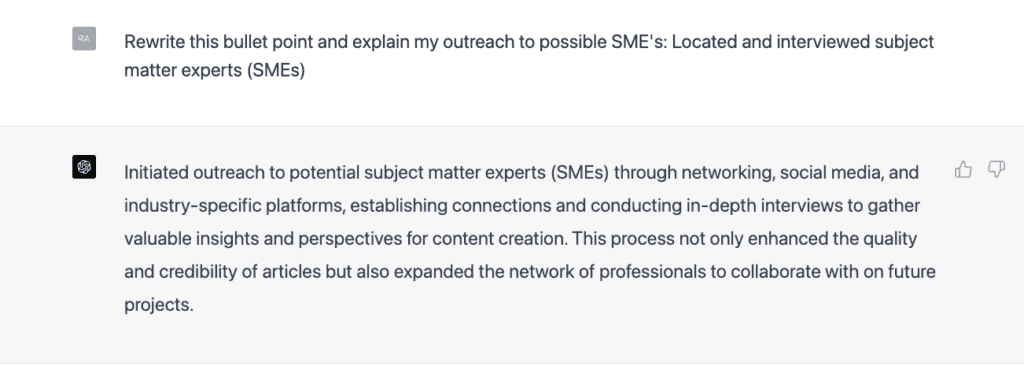
This is pretty good. It’s a little over the top but is a fair assessment of the process. It does a decent job explaining how I reach out to experts and why I interview them for articles. My only complaint is it’s too long for a bullet point and would need some paring down before landing on my resume.
After some experimentation, I decided that part of the problem with asking ChatGPT to write my resume is that it seems to make assumptions based on the input. For example, I asked it to write a bullet point about my SEO writing:
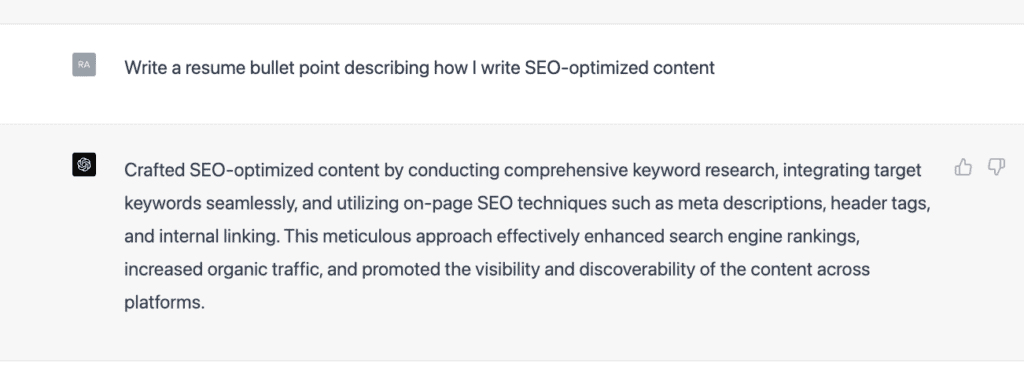
This is both accurate and inaccurate. I do integrate the target keyword seamlessly and use internal linking. However, ChatGPT’s rewrite also describes how I use on-page SEO techniques like meta statements and header tags, and how I conduct “comprehensive keyword research.”
While these activities are part of effective SEO writing, in that particular role, I didn’t do any of that. I think ChatGPT was making assumptions based on my inclusion of “SEO.” So, I asked it to try again, only this time, I specified what aspects of SEO it should ignore:
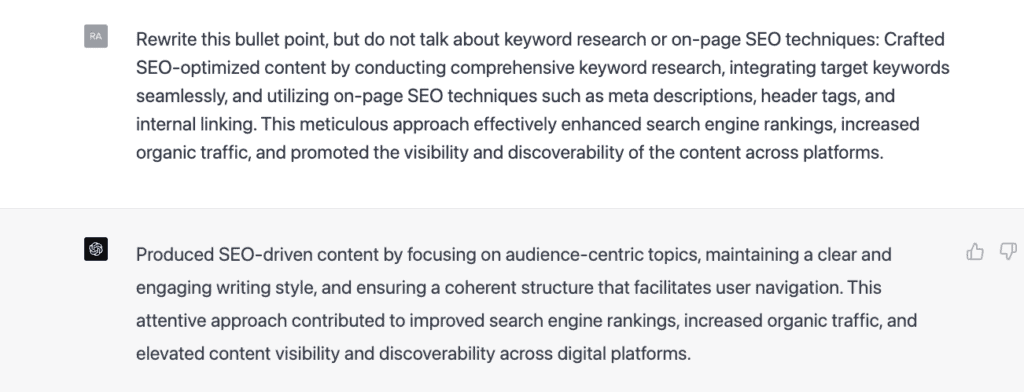
This is a little better. It removes the hallucinations of what I was doing in that role. However, I’d probably delete the second part of the bullet. I did not have access to the metrics and cannot confirm if my SEO writing improved rankings, increased traffic, or elevated content visibility and discoverability (but I hope it did!).
>>MORE: View our list of 80 online job search resources, including AI tools, job application trackers, resume builders, salary databases, job boards, and more.
Should ChatGPT Write Your Resume?
In general, these results were decent but not spectacular. It took several tries to get an output that didn’t overstate or inflate what I was doing and even more tries to ensure my ChatGPT resume didn’t include things I didn’t do at all. Given how much time I spent redirecting the bot, I might have been better off using the initial output as a draft and rewriting my resume without AI assistance from there.
Dilber had a similar experience. After ChatGPT gave her the initial resume bullet points, she asked it to “rewrite these bullet points with examples of results and metrics,” and got a better response. But she also cautions that even with a “better response” you should take the time to review and rewrite ChatGPT’s output.
“You’ll always want to edit for accuracy to make sure you aren’t misrepresenting your work and to make sure it sounds like you. As an applicant, you want to stand out from the crowd. A lot of people are using ChatGPT so if you simply submit what it creates, it’s likely your resume and cover letter will be the same as everyone else,” she says.
So, should you use ChatGPT to write your resume?
“Job seekers should use ChatGPT as a starting point to break the whitespace of a blank page and not as a way to create a finished resume,” advises Miles Jennings, founder of Recruiter.com. “For example, if you’re trying to be a graphic designer, ask it to write an amazing resume for an early career graphic designer. But then you take it from there. Put the output in a Google doc and edit it as much as possible.”
If you’re having trouble getting started or need help rewriting a messy bullet point, using ChatGPT as a resume builder is a great idea. It can be an excellent writing prompt, outline generator, and general guide. But you shouldn’t rely on the output. ChatGPT hallucinates — sometimes despite your best efforts. And if you include these hallucinations on your resume, you may find yourself in an interview getting asked about skills and abilities you don’t actually possess.
Learn more ways to leverage ChatGPT in your job search:
- We Asked ChatGPT to Cover Letters. Here’s What It Got Right (and Wrong)
- Should You Use ChatGPT for Interview Advice?
- How to Use ChatGPT in Your Job Search
- Can You Use ChatGPT to Prepare for Technical Interviews?
- Prompt Engineering Is the New ChatGPT Skill Employers Are Looking For
- 5 Simple-ish Steps for Using ChatGPT to Write Your Accountant Resume
- How to Use ChatGPT to Write an Accountant Cover Letter
- How to Use ChatGPT to Write a Software Engineer Cover Letter
- How to Use ChatGPT to Write a Financial Analyst Cover Letter
Image Credit: Canva
